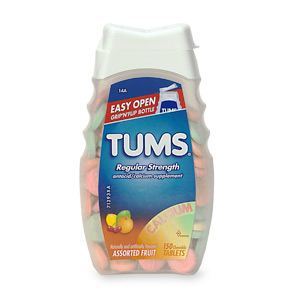What Can I Give My Dog Throwing Up
Last Updated on
Are you wondering if Tums can help your dog with an upset stomach?
You aren't alone. Many pets owners ask about this popular antacid.
 You'll be happy to hear that Tums, when reasonably dosed, is generally safe for dogs.
You'll be happy to hear that Tums, when reasonably dosed, is generally safe for dogs.
In fact, the active ingredient (calcium carbonate) works equally well for canines. So, yes, you can alleviate tummy pains with these chalky chewable tablets.
On the other hand, we do not recommend administering Tums as a way to top up your pet's calcium levels.
Keep reading to learn more…
You Can Give Your Dog Tums
Pepto-Bismol, which is preferred many vets, is also effective for the same purpose.
Tums Is Safe, But Does It Make Sense?
Consider that, often times, minor stomach issues resolve themselves. Giving your dog Tums may be unnecessary and, if so, should be avoided.
A true solution to your buddy's gut problem may be a quality pet probiotic.
Your best course of action is to first have your dog evaluated to rule out what could be a serious stomach sickness.
In any case…
Tums can provide temporary relief when discomfort lingers. Just be sure to give a dose based on their body weight.
Conservative With Calcium Carbonate
Tums dosing for dogs ranges from as little as 1,200mg all the way up to 10 grams. But 2 to 6 grams, over a 24 hour period, is a typical range.
Let's break it down further:
- Small canines = Under 2 grams
- Medium dogs = 2 to 4 grams
- Big sized dogs = 4 to 6 grams
- Giant guy = 6 to 10 grams
Providing Tums proportionally means you will likely need to break up the tablets before giving them to your dog.
Caution: Very small breeds should only get a 1 gram or less dose. In rare cases, like for a tiny little guy, even 1 Tums tab can be too much.
Another Caution: Some Tums products contain xylitol which is a harmful ingredient for animals. Checking labels is essential!
Tums is Not a Calcium Supplement
It cannot be stressed enough:
It's a bad idea to give your dog Tums as a supplement. Too much calcium may lead to pancreatitis among other complications.
Rest assured, a good canine chow will cover calcium requirements.
Get a pet-formulated calcium supplement if your dog really needs extra. Tums is inappropriate for this purpose.
Two Excellent Alternative Remedies
Feeding pureed pumpkin greatly helps and in a nutritious way! There's a chance that Tums could constipate your dog, but this food will almost always normalize things.
Another approach is fasting followed by a reintroduction of mild foods such as boiled chicken and rice.
The need for Tums can typically be avoided assuming your dog is breaking down food efficiently. Feeding smaller portions can also improve matters.
Tums is not a lasting solution.
For Canines With Kidney Failure
There are many antacids including:
- Prilosec
- Alka-Seltzer
- Rolaids
- Zantac
These are fairly similar to Tums.
Veterinarians utilize some of these brands, including for dogs suffering with kidney failure.
Antacids tend to reduce phosphate levels in the blood, which can sometimes be critical for keeping a precious pet alive. Obviously, a professional should advise you on this.
The Bottom Line
Tums, when conservatively dosed, will not harm your dog.
But, the thing is, stomach discomfort usually resolves itself. In other words, giving Tums or any other antacid may be ill-advised.
Even if Tums works on your dog, it is not a long-term digestive solution; nor does it make sense as a calcium supplement.
What Do You Think? Have Your Say Below…
What Can I Give My Dog Throwing Up
Source: https://canigivemydog.com/tums
0 Response to "What Can I Give My Dog Throwing Up"
Post a Comment